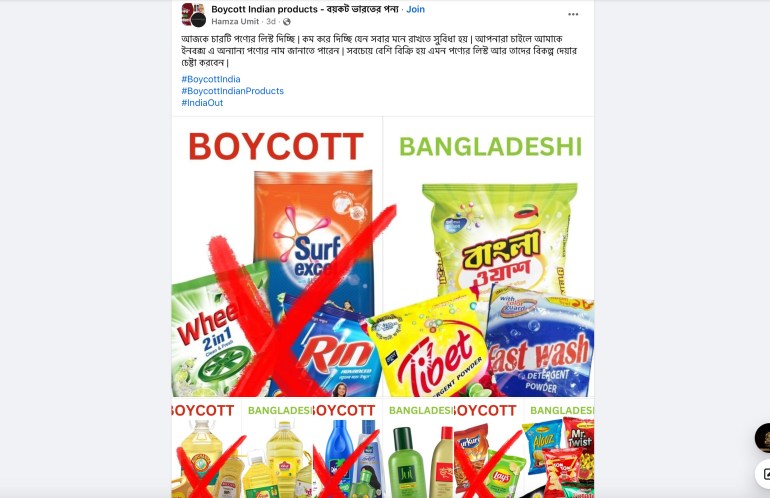Dhaka, Bangladesh – Amid allegations of Indian interference in national elections, there’s a call to boycott Indian goods in Bangladesh.
Last week, a supplier for the Indian consumer goods giant Marico faced a chilly reception in Dhaka’s Panthapath area. Grocery shops, usually eager to stock their shelves with its hair oil, cooking oil, body lotion and other products, refused to take new deliveries.
“Sales of Parachute oil, a Marico bestseller, have plummeted to almost zero in recent weeks,” local shopkeeper Aman Ullah said. “Indian products just aren’t moving. We’re stuck with unsold stock and won’t be restocking.”
Another shop owner who requested anonymity revealed a deeper reason: “I don’t want to sell Indian products any more.” He cited YouTube videos advocating a boycott of Indian goods, which he wholeheartedly supported.
Simmering anti-India sentiment in Bangladesh has boiled over in the past decade, culminating in public displays such as celebrations in Dhaka last year after India’s loss in the Cricket World Cup final.
But after last month’s elections in Bangladesh, in which Prime Minister Sheikh Hasina secured a fourth term while the opposition boycotted the polls, a massive “India Out” campaign was launched, alleging Indian interference in Bangladesh politics.
The Bangladeshi diaspora and opposition groups have fuelled this anti-India movement and advocated boycotts of Indian products. This movement mirrors similar campaigns in the Maldives, where Mohamed Muizzu capitalized on anti-India sentiment to win the presidential election.
In Dhaka, the campaign was launched against the backdrop of India’s traditionally strong ties with Hasina’s government and its strained relationship with the opposition, leading many to believe India favoured the status quo.
Exiled Bangladeshi physician Pinaki Bhattacharya, who fled alleged government harassment in 2018, has emerged as the key figure in this burgeoning social media movement accusing India of interfering in Bangladesh’s recent elections to keep Hasina in power.
Through his more than two million followers across social media platforms, Bhattacharya launched the #BoycottIndia campaign in mid-January, urging them to join “this monumental endeavour”. His call, emphasizing love of homeland and determination to break free from perceived shackles, resonated with thousands.
The anti-India movement has surged online, fuelled by user-generated content. Photos of crossed-out Indian products like Amul butter and Dabur honey are circulating alongside barcode identification tips to boycott these goods. A single post highlighting the 890 prefix used in barcodes for Indian products garnered more than 1,000 shares, showcasing the movement’s online reach.
Why did the campaign gain traction?
The Indian High Commission in Dhaka declined Al Jazeera’s request for a comment on this anti-India campaign.
At a Mumbai forum on January 30 with Indian External Affairs Minister S Jaishankar, attendees raised concerns about India’s foreign policy amid perceived shifts in regional dynamics, particularly the growing pull of major rival China on neighbouring countries like Bangladesh and the Maldives.
Jaishankar downplayed concerns about foreign policy shortcomings but conceded the competitive reality. He pointed out that China’s geographical proximity naturally grants it influence over neighbouring countries like the Maldives, Sri Lanka and Bangladesh.

State Minister of Information and Broadcasting and lawmaker from the ruling Awami League Mohammad A Arafat, too, dismissed the concerns saying Bangladesh had received global attention because of the unprecedented fact of a fourth term for the ruling government.
“If I have to talk about other country’s interest in our local politics, then the first name I would mention is the United States which even declared a Visa restriction policy based on Bangladesh election. On the other hand, India, from the very onset officially stated that Bangladesh’s election is its internal matter and it has no say in it,” Arafat said.
Obaidul Quader, general secretary of Awami League told Al Jazeera that the “India out” campaign is run by opposition parties who instead of taking part in the election blaming “India for their misfortune.”
“They [the opposition parties] have this trump card of bashing India if anything goes against them,” said Quader, “I don’t think common people of Bangladesh support this campaign. They know that Awami League will never work against the interest of people.”
The burgeoning anti-India campaign, meanwhile, is finding traction within Bangladesh’s domestic political landscape, raising concerns about potentially destabilising Bangladesh’s economy and impacting regional relations.
Gono Odhikar Parishad, a rising political force aligned with the Bangladesh Nationalist Party (BNP)-led opposition, is promoting the boycott movement. Party leader Nurul Haque Nur declared at a recent rally in Dhaka that “We all have to start an ‘India Out’ campaign’” while alleging Indian interference in the recent elections.
Rumeen Farhana, international affairs secretary of the BNP, told Al Jazeera that the people of Bangladesh never liked India’s interference in Bangladesh politics. “It’s now crystal clear that India did everything possible to keep the regime in power since 2014,” she alleged.
Resentment against India reached a boiling point in Bangladesh after Hasina’s Awami League secured a resounding victory in the January 7 elections, capturing 223 seats out of 300 in parliament. Critics alleged the process lacked legitimacy due to the opposition’s boycott and the presence of numerous Awami League-backed independent candidates, raising questions about the fairness of the vote.
Indian Prime Minister Narendra Modi offered swift congratulations to both Hasina and “the people of Bangladesh for the successful conduct of elections”, endorsing the outcome. In contrast, Western governments expressed reservations, highlighting the boycott and the lack of a strong opposition presence.

Farhana said anti-India public sentiment in Bangladesh goes beyond politics. “The border killing, unresolved water sharing of 53 rivers including Teesta, trade deficit all play roles to that,” she said.
Around 1,276 Bangladeshis have been killed and 1,183 injured by India’s border forces since 2010, according to human rights organisation Odhikar. Then there are the decades-old unresolved water-sharing agreements for 53 transboundary rivers in addition to Bangladesh’s massive trade deficit with India, all of which have raised concerns about Bangladesh’s sovereignty and economic independence.
Ali Riaz, distinguished professor of politics and government at Illinois State University, told Al Jazeera that India’s unqualified support of the Awami League and Hasina during the 2024 elections has raised questions among many citizens about “whether it has compromised the country’s sovereignty”.
However, Sreeradha Datta, a professor at the Jindal School of International Affairs in Sonepat, India, refuted the claims of India’s “unqualified support” and said the Awami League was “creative in going past the polls even if India [had] not agree[d] to recognise the election”.
“China and so many others congratulated PM Hasina right after the election, so would that make any difference if India didn’t support it?” she asked.
The economic fallout
Analysts, meanwhile, pointed out that boycotting Indian goods could have major repercussions for the economic relationship between the two countries.
India is a major exporter to Bangladesh with annual trade historically exceeding $12bn. Additionally, Bangladesh relies heavily on India for essential commodities, and the two governments are currently in talks on an annual quota of imports of Indian farm products.
Calling the anti-India campaign a “political stunt”, Munshi Faiz Ahmed, former chairman of the Bangladesh Institute of International and Strategic Studies, a state-funded think tank, told Al Jazeera that the economic fallout of boycotting Indian products will be more severe for Bangladesh.
“I don’t think any rational Bangladeshi would opt for taking part in this campaign. India is our neighbouring country, and we are heavily dependent on them for our everyday essentials like rice and onions. We are dependent because we get those products at the cheapest prices because of geographical proximity,” Ahmed said, adding that sourcing those products from somewhere else would cost much more.
Jyoti Rahman, an Australia-based economist told Al Jazeera that the “India Out” movement may be politically important to the extent that “it sends a strong message to the Indian policymakers” about growing discontent in Bangladesh but the “economic effects are less clear cut”.
Rahman pointed out that despite being India’s fourth largest export destination, Bangladesh still comprises about 3.5 percent of the Indian export market. “Even if all exports to Bangladesh stopped, it probably wouldn’t significantly affect the Indian economy as these products would find a market elsewhere,” Rahman said.
On the other hand, he said, a fifth of Bangladeshi imports are from India, including essentials such as cotton for the garment manufacturing sector, cereals and produce such as onions. “[Looking at] other sources of imports for these products could stoke inflation further,” Rahman said.
However, he highlighted the potential political effectiveness of boycotting non-essential items like tourism, cultural imports like Bollywood movies and consumer products, which he said could benefit domestic industries.
The overwhelming dependence of Bangladesh on India also means that “Indian businesses are vulnerable if such a movement gains traction and support”, Riaz said.
Even if the economic impacts are limited or not immediate, the boycotts will contribute to the public discourse on the role of India in Bangladeshi politics and highlight the unequal relationship, he said. “This is no less important.”
Additional reporting by Abu Jakir
Sumber: www.aljazeera.com
 Skip to content
Skip to content

